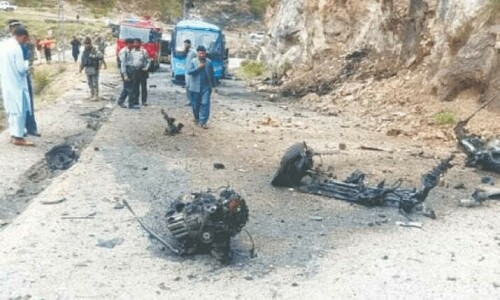KARACHI, Dec 12: Experts representing six regional countries agreed to forge an alliance on climate change issues at a three-day conference, which concluded in a hotel here on Thursday.
The conference was organised by the World Wide Fund for Nature-Pakistan under the European Commission-funded Climate Change Adaptation Project.
Sharing challenges posed by changing climatic conditions in their respective country, experts representing Iran, Bangladesh, Sri Lanka, the Maldives, Nepal and Pakistan said that floods, heavy rainfalls, cyclones and other calamities related to unusual weather pattern had become a common phenomenon in the region and that they could learn from one another’s experiences.
Incorporation of local knowledge into scientific data to mitigate the intensity of disasters, better management of natural resources and enhancing knowledge of local communities was a need of the hour, they said.
Informing the audience about the climate change issues communities are facing in Keti Bunder and Kharo, programme sociologist of the WWF-P Shahzadi Tunio said the two coastal towns had gone through drastic ecological changes.
“The towns consist of about 4,000 households, spread over 60 settlements. Of them, 28 have been submerged by the intruding sea over the last 40 years,” she said, adding that adaptation plans would help communities better cope with changing weather patterns.
Highlighting concerns regarding climate change, programme officer of the WWF-Nepal Ramesh Adhikari said the people had been experiencing droughts and floods in different parts of the country.
“Glaciers are melting and people are facing water and food security issues. These challenges forced the government to launch awareness programmes on water conservation whose results are now visible as people have started conserving and making a judicious use of water,” he said.
He underlined the importance of community participation in tackling climate change issues and said that adaptation plans could only be successful if they were sustainable and owned by the communities where they would be implemented.
Dr Hossain Negarestan of the Iranian Fisheries Research Organisation said that Pakistan, Iran, Bangladesh, Nepal and the Maldives had a similar monsoon pattern and were, therefore, experiencing almost similar effects of climate change. Evaluation and monitoring of adaptation plans on a regular basis could prove successful, he said.
Senior director of the WWF-P Dr Ejaz Ahmed said that disaster risk reduction plans would help minimise human loss, livelihood and assets. He also said that the participation of government departments in research efforts regarding climate change impacts should be enhanced. Besides, he said, government officials needed to be educated and trained on climate change issues.
“Introduction of sustainable agriculture and fisheries, water management, establishment of raised platforms and provision of early warning system facilities at Keti Bunder and Kharo Chann would help communities survive and improve quality of their life,” he said.
Regional director of the WWF-P Rab Nawaz said that effective regional collaboration could play a pivotal role in addressing climate change issues. Coastal communities in Pakistan, he said, had been suffering badly; there was a drastic reduction in river water supplies because of upstream diversions and, then, there was intrusion of seawater which was threatening people’s lives and infrastructure.
“It is said that one man’s disaster becomes another man’s opportunity. This seems to be quite true in the case of these impoverished coastal towns, where different organisations are making a lot of money out of these disasters and exploiting local communities,” he said.
Giving his remarks, president of the Global Climate Adaptation Partnership Thomas E. Downing said that active participation of different stakeholders could mitigate climate change impacts and in that connection his organisation was working with regional partners to design a comprehensive action plan. It was the right time for climate change experts in Pakistan to support vulnerable communities in the coastal areas of the country, he said.
During the programme, experts from six countries presented their suggestions on climate change adaptation plans.












































Dear visitor, the comments section is undergoing an overhaul and will return soon.